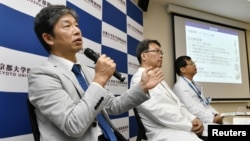Japanese scientists said Monday they will start clinical trials next month on a treatment for Parkinson's disease, transplanting "reprogrammed" stem cells into brains, seeking a breakthrough in treating the neurodegenerative disorder.
Parkinson's is caused by a lack of dopamine made by brain cells, and researchers have long hoped to use stem cells to restore normal production of the neurotransmitter chemical.
The clinical trials come after researchers at Japan's Kyoto University successfully used human-induced pluripotent stem cells (iPS) to restore functioning brain cells in monkeys last year.
So-called iPS cells are made by removing mature cells from an individual — often from the skin or blood — and reprogramming them to behave like embryonic stem cells. They can then be coaxed into dopamine-producing brain cells.
"This will be the world's first clinical trial using iPS cells on Parkinson's disease," Jun Takahashi, professor at Kyoto University's Centre for iPS Cell Research and Application, told a news conference.
The center is headed by Shinya Yamanaka, who in 2012 shared a Nobel Prize for medicine with a British scientist, John Gurdon, for the discovery that adult cells can be transformed back into embryo-like cells.
"We intend to carry on conducting our research carefully, yet expeditiously, in coordination with Kyoto University Hospital, so that new treatment using iPS cells will be brought to patients as soon as possible," Yamanaka said in a statement.
The fact that the clinical trial uses iPS cells rather than human embryonic cells means the treatment would be acceptable in countries such as Ireland and much of Latin America, where embryonic cells are banned.





